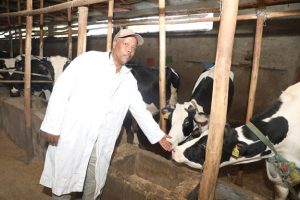BY EPHERM ANDARGACHEW
Fruits and vegetables are important sources of nutrients in diets. Consuming adequate fruit and vegetable can help to prevent non-communicable diseases. Accordingly, World Health Organization (WHO) recommended that adults consume 400 grams of fruits and vegetables daily. Yet globally, fruit and vegetable consumption often falls far below this objective and studies suggest consumption is especially low in developing and middle-income countries.
Because affordability is a major reason not to meet the WHO target since many people would have to spend 30 to 50 percent of their average income on fruits and vegetables. Therefore, sorting out methods to make fruits and vegetables more affordable must be a public health priority in developing countries.
Taking the importance of fruits and vegetables for a healthy diet, currently, fruits and vegetables among the various agricultural products have gained huge attention in Ethiopia. Ethiopia indeed has huge potential for the production of high-value fruits and vegetables that can be utilized and consumed by the communities. The Government has been putting in enormous efforts in the past few years to enhance the production of fruits and vegetables across the country.
Because at the household level, the food consumption habit, in Ethiopia, is dominated by cereals and pulses, while the consumption of fruits and Vitamin A-rich vegetables are rare both in urban and rural areas.
According to Ethiopian Prime Minister Abiy Ahmed, “the avocado productivity endeavors we embarked upon two years ago have shown to be fruitful. We need to strengthen our fruit and vegetable production capacities, in the same manner, we have done so with wheat to enable self-sufficiency.”
It is common knowledge that fruits and vegetables play several important roles in human health. They provide antioxidants such as vitamins A, C, and E that are important in neutralizing free radicals (oxidants) known to cause cancer, cataracts, heart disease, hypertension, stroke, and diabetes.
Fruits and vegetables are good sources of minerals such as iron, zinc, calcium, potassium, and phosphorus and contain ample fiber, important for digestion and bowel movements. Overall, WHO places low fruit and vegetable consumption among its twenty risk factors in global mortality, just behind the better-known killers such as tobacco use and high cholesterol levels.
Ethiopia has endowed with huge potential for the production of high-value fruits and vegetables. Nevertheless, ensuring food security via diversified food preferences faces great challenges due to the rapid increment of population, change of fertile farmland to construction for the urban dwellers, climate change, decline of available natural resources, inflation of basic needs, young unemployment, political turmoil, and civil conflict.
Even in the absence of supply problems usually increases the price of fruits and vegetables especially organs every day. This makes the consumption of oranges difficult for middle-income communities. Cognizant of the challenges and the potential of the country into account, Haramaya University Tonic Research Center is carrying out problem-solving research and activities that preserve and ensure the production of fruits and vegetables, especially, oranges.
Tonic Research Center Director Mr. Shibiru Wakjira said that the center has been serving as a fruit and vegetable research institute since 1972. The center is known not only as an orange research center but also provides oranges, other fruits, and vegetation production to society at a lower price.
Every year, the center has prepared and provided improved oranges seedlings namely Enqulal, Hamlin, Valencia, Sour, Washington, and so on as well as papayas, and various types of vinegar to the communities through regional agricultural Offices, NGOs, Institutions, cooperatives, farmers Unions, and Universities, he stated.
Currently, with the support of the Tonic research center, Eastern Hararge wordas have set up nurseries and prepared more than 21,000 fruit and vegetable seedlings this year. Besides, in the past, the center had prepared up to 5,000 fruit and vegetable seedlings and provided them to the community, according to Shibiru.
In the 2021/2022 farming seasons, the center has distributed more than 10,000 saplings since the focus of the government on fruit and vegetable in the Green Legacy initiatives increase the demand for seedlings.
Apart from conducting research, the center provides improved seedlings that are disease and drought-resilience. It also preserves over 53 varieties of indigenous mangoes and several varieties of sweet oranges. Additionally, the center has been working to reduce the cost of living by selling various fruit and vegetable products produced by the Tonic research center to the public at low prices, he added
Haramaya University researcher and project coordinator Professor Kebede Woldetsadik explained that providing improved research technologies supports the communities to improve the productivity of fruit and vegetable and the income of the Ethiopian smallholder farmers.
Local seed varieties are susceptible to pests and diseases, he added, and by making high-quality vegetable seeds, suitable to the local climate, accessible, and affordable to local farmers, the challenges could be reduced, he indicated.
It is general knowledge that research institutions, like Tonic Farm center, play a significant role in innovation, generating new knowledge and technologies, which ensure fruit and vegetable development, food security, and technological advancement. They also attract researchers, investments, and other research facilities for new knowledge.
Hence, supporting them is significant to strengthen research output and fruit and vegetable productivity across the country. Because fruit and vegetable cost is a presumed barrier to intake. Fruit and vegetable cost does impact availability and has the greatest impact on high-cost items. Although cost was inversely related to availability.
Ethiopian Ministry of Irrigation and Lowland Minister Aisha Mohammed in her part noted that Universities should work hard to strengthen the existing fruits and vegetable production to replace the imported ones domestically with the development of small-scale irrigation technology.
Major fruits and vegetable production constraints include pests, drought, fertilizer shortage, and fuel price for pumping irrigation water. Hence, universities should play the leading role that the farmers should not face scarcity of seeds and technologies important for production, she highlighted.
Indeed, the WHO recommends 400 grams of fruits and vegetables per day as a result of their taste and Vitamin contents. Despite a wealth of suitable land availability, there is currently a shortage of fruits and vegetables across the country. Therefore, supporting Universities like Tonic fruit and vegetable farms and research activities is key to utilizing the untapped potential of the country.
THE ETHIOPIAN HERALD TUESDAY 13 DECEMBER 2022




